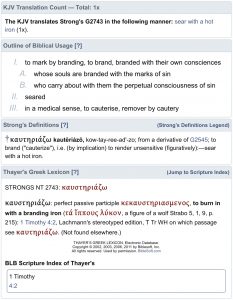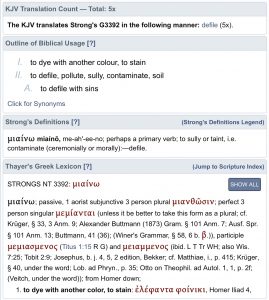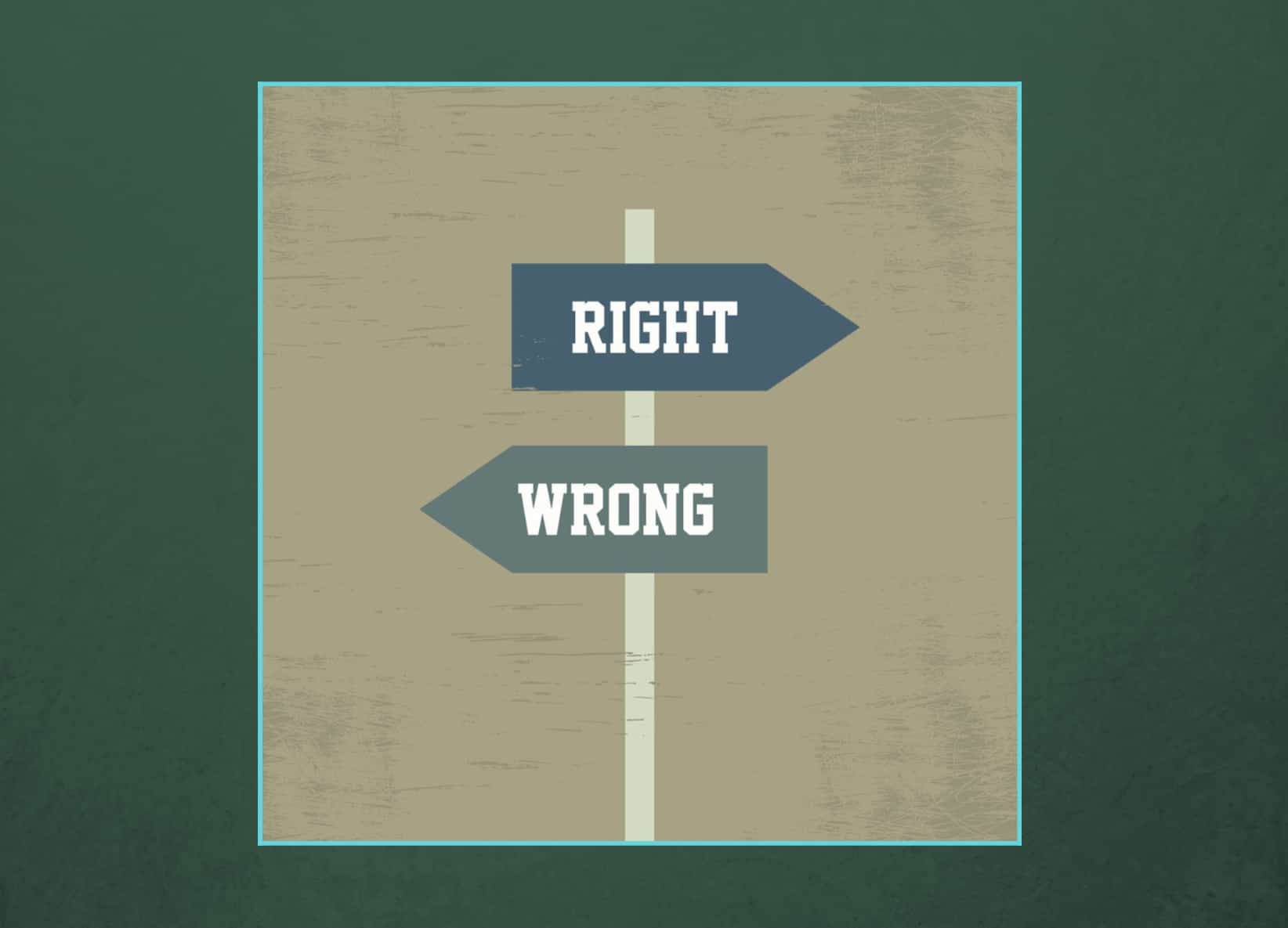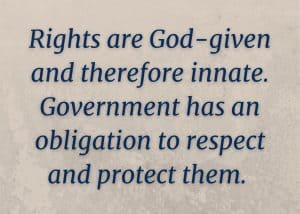Our greatest happiness does not depend on the condition of life in which chance has placed us, but is always the result of a good conscience, good health, occupation, and freedom in all just pursuits.
—Thomas Jefferson—
Key point: Without consciences, leftists can’t recognize or respect the consciences of others. Yet they are intimidated by people who exercise conscience rights, and therefore are determined to bring them down.
On Monday, March 1, 1971, the second of two pilot episodes was broadcast of what would become an extremely popular murder mystery series. The first of the pilots, “Prescription, Murder,” had been televised three years earlier, on Tuesday, February 20, 1968.

The second pilot set the stage for the first of nine seasons and 53 regular episodes of Columbo, plus 14 specials. A total of nearly 35 years passed from the date the first pilot aired until January 30, 2003, when the final Columbo movie, “Columbo Likes the Nightlife,” was televised.
The success of Columbo, of course, was tied directly to star Peter Falk, who made the character his own. Writing about the unforgettable detective and the series that bears his name, Gwen Ihnat notes,
 Falk made the detective’s underdog appeal unforgettable. So much credit must be given to the way he completely inhabited the character; within an episode or two, viewers learned Columbo’s every idiosyncrasy. Not just his trenchcoat, his cigar, and his car, but his stooped posture, his gestures, his tendency to pull random objects out of his pockets, and his unfailing politeness, even when speaking to a party he knows is guilty. Unlike gritty cops of the era, he didn’t even carry a gun. Falk described the character in his 2007 autobiography (Just One More Thing, the title adapted from Columbo’s personal catchphrase) as “a guy with a mind like Einstein who sounded like the box boy at Food Giant.” Falk hand-selected Columbo’s permanent wardrobe—including the legendary raincoat as well a tie and shoes from his own closet—and picked out the beat-up 1959 Peugeot 403 convertible right out of the lot. All of these elements fleshed out this original character in a wholly three-dimensional way, creating an irrepressible, relatable everyman.
Falk made the detective’s underdog appeal unforgettable. So much credit must be given to the way he completely inhabited the character; within an episode or two, viewers learned Columbo’s every idiosyncrasy. Not just his trenchcoat, his cigar, and his car, but his stooped posture, his gestures, his tendency to pull random objects out of his pockets, and his unfailing politeness, even when speaking to a party he knows is guilty. Unlike gritty cops of the era, he didn’t even carry a gun. Falk described the character in his 2007 autobiography (Just One More Thing, the title adapted from Columbo’s personal catchphrase) as “a guy with a mind like Einstein who sounded like the box boy at Food Giant.” Falk hand-selected Columbo’s permanent wardrobe—including the legendary raincoat as well a tie and shoes from his own closet—and picked out the beat-up 1959 Peugeot 403 convertible right out of the lot. All of these elements fleshed out this original character in a wholly three-dimensional way, creating an irrepressible, relatable everyman.
Columbo — The Second Pilot Episode

The second pilot episode was titled “Ransom for a Dead Man.” In it, Leslie Williams, played by Lee Grant, fatally shoots her husband, disposes of his body, and attempts to make his disappearance look like a kidnapping. The ruse was complete with a ransom note, a telephone call from the “kidnapper” that included a brief statement from Leslie’s husband (a short, prerecorded message coming over a perfectly timed phone call made possible by the latest technology), and instructions about where to drop the money. Leslie has to sell assets to raise all of the $300,000 demanded, and in doing so she manages to grab hold of the lion’s share of her dead husband’s wealth. A pilot for small aircraft, she flies over the drop-off point and tosses out an empty handbag that is supposed to contain the money. The cash actually is hidden away in an identical handbag she discretely exchanged for the empty one before taking off in the plane.
Spoiler alert! If you haven’t seen this episode, I need to warn you that the following will give away important plot details. Leslie has a stepdaughter, Margaret (Patricia Mattick). Margaret has been overseas attending a boarding school. She returns for her dad’s the funeral and soon suspects Leslie has murdered her father. Of course, Margaret is angry, and she is very open with with her stepmother about what she believes. Eventually Leslie uses bribery to convince Margaret to return to school and to keep her mouth shut.

Just before Margaret boards her flight, Leslie slides a cash-filled briefcase across the counter to her and tells her that someone will meet her at the other end of her flight and open a bank account for her. Margaret boards the plane, and a few moments later, Leslie encounters Lieutenant Columbo. He is reading a newspaper and waiting waiting to talk to her. They sit down at a table at the airport café to have drinks and to talk, and in the middle of their conversation a plainclothes officer brings Columbo the same briefcase Leslie gave to Margaret before she boarded the plane.

You can hear the seminal portion of Leslie’s and Columbo’s conversation here. This audio clip was taken from this video.
Note carefully what Columbo tells Leslie: Mrs. Williams, you have no conscience, and that’s your weakness. Did it ever occur to you that there are very few people that would take money to forget about a murder? It didn’t, did it? I knew it wouldn’t. No conscience. Limits your imagination. You can’t conceive of anybody being any different than what you are. And you’re greedy. And that’s why, as bright as you are — and you’re bright — you believed that Margaret could be bought.
Mrs. Williams, you have no conscience, and that’s your weakness.
— Lieutenant Columbo to murderess Leslie Williams in “Ransom for a Dead Man” —

Founding Father Patrick Henry once said, “He that hath a blind conscience which sees nothing, a dead conscience which feels nothing, and a dumb conscience which says nothing, is in as miserable a condition as a man can be on this side of hell.” The problem is this: The individual with a conscience like this (and that person essentially is lacking a conscience altogether) doesn’t realize just how miserable and wretched his or her condition is. Furthermore, as Columbo indicated, the person can’t imagine or recognize a conscience possessed by another, let alone respect it.
The Conscience: A Biblical Perspecitve
The New Testament tells us some very important information about the human conscience. In the King James Version, the Greek word translated conscience appears “32 times in 30 verses.” You can see those on this page.

Here are some truths and principles represented in numerous passages that contain the word translated “conscience.” The links provided will take you to the designated verses as they appear in the New King James Version.
First, Paul validated the conscience as helpful in determining right from wrong (see Acts 24:15-16).
Second, people everywhere have consciences that help them to know right from wrong, innately (see Rom. 2:14-16). Go here for a brief discussion of three specific elements in these verses that testify that every individual is guilty before a holy God.
Third, the command that Christians submit to governing authorities is directly tied to God’s law — His absolute standard of right and wrong. It is the duty of government to reward those who do right and to punish those who do wrong, and the standard by which they mete out commendations and punishments is to be God’s standard. That said, Christians aren’t merely to obey governing authorities to avoid punishment; they also are to obey “for conscience’ sake” (see Rom. 13:1-7, esp. v. 5).
Fourth, with regard to behavior that Scripture does not forbid, certain believers may not think of their participation in a particular activity as being wrong. Yet believers must be mindful of other believers who do believe that activity is wrong. No Christian should exercise his or her freedom to do a particular thing if it leads another person who thinks it is wrong to do it. Believers are to be mindful and respectful of other believers’ consciences (see Rom. 14:22-23; 1 Cor. 8:4-13; 10:25-33; note that Rom. 14:22-23 does not use the word for conscience, but the principle still is highlighted).

Fifth, as Paul and his companions preached God’s message to others, they avoided all deception and trickery that would artificially inflate the number of those responding. In other words, they were transparent and authentic, seeking to persuade people in legitimate ways, ways that did not manipulate. Their authenticity was so evident their hearers knew that Paul and the members of his team were the real deal. Thus, Paul and the others didn’t manipulate the consciences of their hearers (see 2 Cor. 4:2).
Sixth, engaging effectively in spiritual warfare involves exercising faith and a good or clear conscience. Rejecting these will lead to disaster and severely hinder one’s ability to fight against evil (see 1 Tim. 1:18-19).
Seventh, leaders in the church must have clear consciences (see 1 Tim. 3:8-9).
Eighth, a person’s conscience can be manipulated, damaged, and effectively eliminated (see 1 Tim. 4:1-2; Titus 1:15).
Theologian John A. Whitmer offers a succinct summary of the New Testament’s teaching about the conscience in this paragraph. Here he is using the New International Version in his citations of various Scripture passages.
Conscience is an important part of human nature, but it is not an absolutely trustworthy indicator of what is right. One’s conscience can be “good” (Acts 23:1; 1 Tim. 1:5, 19) and “clear” (Acts 24:16; 1 Tim. 3:9; 2 Tim. 1:3; Heb. 13:18), but it can also be “guilty” (Heb. 10:22), “corrupted” (Titus 1:15), “weak” (1 Cor. 8:7, 10, 12), and “seared” (1 Tim. 4:2). All people need to trust the Lord Jesus Christ so that “the blood of Christ” might “cleanse [their] consciences” (Heb. 9:14).1
Rights of Conscience
With the biblical worldview that they held, America’s Founding Fathers recognized the reality of an individual’s conscience, as well as every person’s duty before God to do what was right. Accordingly, they affirmed and upheld conscience rights in and for the new nation (go here and here).
It is no surprise that a recognition of conscience rights as legitimate and unalienable is rooted in biblical Christianity. Nor can it be a surprise that when a nation abandons the God of the Bible (as America has), its recognition of conscience and conscience rights goes out the window.
“Seared with a Hot Iron” and “Corrupted”
Here is the stark truth. Our nation has become like Leslie Williams. No conscience. Furthermore, even though unalienable rights such as rights of conscience are guaranteed in the US Constitution, these are being thoroughly trashed for the everyday citizen. The left is morally bankrupt and blind, essentially incapable of recognizing and respecting the consciences of those who still espouse a sense of their own responsibility before God to live pure lives and to do what is right. There’s more. Leftists cannot abide any reminders of human accountability to God.
These realities provide fertile ground for millions in this country to act immorally and unethically, and without any kind of transcendent framework to keep wrong behavior at bay. Remember that during the summer of 2020 “peaceful” protestors burned down cities and killed many innocent people.
Why are leftists running roughshod over the conscience rights of ordinary citizens? In part because they cannot abide any reminders of human accountability to God.
In this mix, the people who refuse to violate their consciences stand out. They are people like Barronelle Stutzman, Jack Phillips, and Tom and Nancy Rost, to name just a few. Hopefully, even if it is on a less public stage, you and I also are living according to, not just our consciences, but the laws of God that human consciences uphold when they operate as they should. These laws are not up for negotiation or debate, and they include the Ten Commandments.
Let’s look again at the passages we cited above in the eighth item.
-
-
- In 1 Timothy 4:1-2, Paul wrote this to Timothy, his protégé who was a pastor: “Now the Spirit expressly says that in latter times some will depart from the faith, giving heed to deceiving spirits and doctrines of demons, speaking lies in hypocrisy, having their own conscience seared with a hot iron.”
- In Titus 1:15, the apostle shared this observation with Titus, another friend who, like Timothy, was a pastor: “To the pure all things are pure, but to those who are defiled and unbelieving nothing is pure; but even their mind and conscience are defiled” or “corrupted” (NIV).
-
Here is some of the information available at blueletterbible.org about the word translated “seared with a hot iron” in 1 Timothy 4:2:

Here is a portion of the information available at blueletterbible.org about the word translated “defiled” or “corrupted” in Titus 1:15, where it is used twice.

The Conflict is Spiritual
How should we as Christians respond?
First, we fight spiritual battles with spiritual weapons.
-
-
- We must “be sober, be vigilant; because your adversary the devil walks about like a roaring lion, seeking whom he may devour” (1 Pet. 5:8).
- We must remember that “we do not wrestle against flesh and blood, but against principalities, against powers, against the rulers of the darkness of this age, against spiritual hosts of wickedness in the heavenly places” (Eph. 6:12).
- Accordingly, we must guard against being led by “philosophy and empty deceit, according to the tradition of men, according to the basic principles of the world, and not according to Christ” (Col. 2:8).
- We must understand that “though we walk in the flesh, we do not war according to the flesh. For the weapons of our warfare are not carnal but mighty in God for pulling down strongholds, casting down arguments and every high thing that exalts itself against the knowledge of God, bringing every thought into captivity to the obedience of Christ” (2 Cor. 10:3-5).
- Thus, we must engage in this and every spiritual conflict using the “whole armor of God” (see Eph. 6:10-18).
-
Second, we have to resolve that we will not be intimidated by those who have no conscience and who refuse to recognize or respect our consciences or our rights of conscience. This means we will say with the psalmist,
In God (I will praise His word),
In God I have put my trust;
I will not fear.
What can flesh do to me? (Ps 56:4).
Third, we must exercise our rights of conscience, living before God in ways that, to the best of our ability to determine, please Him. This means living according to God’s law and upholding and doing what we know to be right, even when it is costly. At every opportunity, we need to remind our fellow Americans that conscience rights are God-given. They are not created by the government; instead, government is obligated to recognize them and respect them. With God’s blessing, actions that remind people and government of these realities can have a far-reaching and profound effect.
Fourth, as believers we must stand together, in support of one another, as we exercise our rights of conscience and additional God-given rights. We cannot stand alone; we must stand shoulder to shoulder. This is what the church does when it is operating as it should.
Fifth, we pray. Our stands for what is right may win some over, and when they do, we will rejoice. God has to engineer this; we cannot. For our part, we do our best, with divine help, to cooperate with the Lord to show everyone how following His law gives true liberty. We ask God to use us to encourage all people abandon their own ways and follow Him instead. Not everyone will respond positively, but some will.
The Bottom Line
While it may appear that those without consciences have the upper hand and will prevail in the end, they will not. Remember that it was a lack of conscience that brought down Leslie Williams. She was caught, and so will everyone else be caught who has abandoned his or her conscience and allowed it to be corrupted.
Count on it.
Copyright © 2021 by B. Nathaniel Sullivan. All rights reserved.
Unless otherwise indicated, Scripture has been taken from the New King James Version®. Copyright © 1982 by Thomas Nelson, Inc. Used by permission. All rights reserved.
The Scripture quotations designated NIV have been taken from The Holy Bible, New International Version®, NIV® Copyright © 1973, 1978, 1984, 2011 by Biblica, Inc.® Used by permission. All rights reserved worldwide.
Note:
1John A. Whitmer, “Romans” in The Bible Knowledge Commentary, New Testament Edition, John F. Walvoord and Roy B. Zuck, eds. (Victor Books, 1983), 446.


Be First to Comment